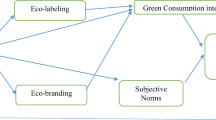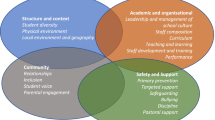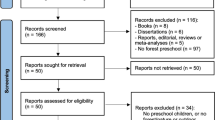Abstract
Our research aims to investigate the approaches that Greek parents use to raise their children’s environmental awareness. The study, conducted via closed-type questionnaires, focused on 435 parents with children attending the last grade of primary school in the greater Athens urban area. The results indicate that parents accept environmental awareness as a particularly important factor in the development of their children’s character. They also claim that their daily actions help to raise their children’s environmental awareness. On the basis of their responses on their daily actions, five groups of parents were identified using cluster analysis. The actions of the groups cover all the ranges, from being strongly consistent to being indifferent. The results also indicate that highly educated, younger, female parents claim more environmentally friendly actions.
Similar content being viewed by others
References
Ajzen, I. (1991). The theory of planned behavior. Organizational Behavior and Human Decision Processes, 50, 179–211.
Aldenferder, M. S., & Blashfield, R. K. (1984). Cluster analysis: Quantitative applications in the social sciences. London: Sage.
Arvai, J. L., Baird, A., & Campbell, V. E. A. (2004). Teaching students to make better decisions about the environment: Lessons from the decision sciences. The Journal of Environmental Education, 36(1), 33–44.
Barr, S. (2004). Are we all environmentalists now? Rhetoric and reality in environmental action. Geoforum, 35, 231–249.
Boyes, E., Stanisstreet, M., & Spiliotopoulou Papantoniou, V. (1999). The ideas of Greek high school students about the ozone layer. Science Education, 83(6), 724–737.
Chan, K. (1996). Environmental attitudes and behaviour of secondary school students in Hong Kong. The Environmentalist, 16, 297–306.
Chan, K. (1999). Mass media and environmental knowledge of secondary school students in Hong Kong. The Environmentalist, 19, 85–97.
Chawla, L. (1999). Life paths into effective environmental action. The Journal of Environmental Education, 31(1), 15–26.
Chawla, L., & Flanders-Cushing, D. (2007). Education for strategic environmental behavior. Environmental Education Research, 13(4), 437–452.
Eagly, A. H., & Chaiken, S. (1993). The psychology of attitudes. Orlando, FL, USA: Hartcourt Brace College.
Furnham, A. (1999). Economic socialization: A study of adults’ perceptions and uses of allowances (pocket money) to educate children. British Journal of Developmental Psychology, 17, 585–604.
Gambro, J., & Switzky, H. (1999). Variables associated with American high school student’s knowledge of environmental issues related to energy and pollution. The Journal of Environmental Education, 30(2), 15–22.
Grob, A. (1995). A structural model of environmental attitudes and behavior. Journal of Environmental Psychology, 15(3), 209–220.
Hampel, B., Holdsworth, R., & Boldero, J. (1996). The impact of parental work experience and education on environmental knowledge, concern and behaviour among adolescents. Environmental Education Research, 2(3), 287–300.
Hungerford, H. R., Peyton, R. B., & Wilke, R. J. (1980). Goals for curriculum development in environmental education. The Journal of Environmental Education, 11, 42–47.
Jans, M. (2004). Children as Citizens: Towards a contemporary notion of child participation. Childhood, 11(1), 27–44.
Jessor, R., & Jessor, S. L. (1977). Problem behaviour and psychological development. A longitudinal study of youth. New York, NY: Academic Press.
Kahneman, D., & Tversky, A. (2000). Choices values and frames. Cambridge, England: Cambridge University Press.
Kaiser, F. G. (2006). A moral extension of the theory of planned behavior: Norms and anticipated feelings of regret in conservationism. Personality and Individual Differences, 41, 71–81.
Kotchen, M., & Reiling, S. (2000). Environmental attitudes, motivations, and contingent valuation of non-use values: A case study involving endangered species. Ecological Economics, 32(1), 93–107.
Kuhlemeier, H., Van den Bergh, H., & Lagerweij, N. (1999). Environmental knowledge, attitudes and behaviour in Dutch secondary education. The Journal of Environmental Education, 30(2), 4–14.
Littledyke, M. (2004). Primary children’s views on science and environmental issues: Examples of environmental cognitive and moral development. Environmental Education Research, 10(2), 217–235.
Papanastasiou, C. (2002). School, teaching and family influence on student attitudes toward science: Based on TIMSS data for Cyprus. Studies in Educational Evaluation, 28, 71–86.
Payne, P. (2005). Families, homes and environmental education. Australian Journal of Environmental Education, 21, 81–95.
Rickinson, M. (2001). Learners and learning in environmental education: A critical review of the evidence. Environmental Education Research, 7(3), 307–320.
Schultz, P., Gouveia, V., Cameron, L., Tankha, G., Schmuck, P., & Franek, M. (2005). Values and their relationship to environmental concern and conservation behavior. Journal of Cross-Cultural Psychology, 36(4), 457–475.
Sebba, R. (1991). The landscapes of childhood: The reflections of childhood’s environment in adult memories and in children’s attitudes. Environment and Behavior, 23, 395–422.
Shepardson, D. (2005). Student ideas: What is an environment? The Journal of Environmental Education, 36(4), 49–58.
Smyth, J. C. (2006). Environment and education: A view of a changing scene. Environmental Education Research, 12((3&4)), 247–264.
Stern, P. (2000). Towards a coherent theory of environmentally significant behavior. Journal of Social Issues, 56(3), 407–424.
Van Gorp, J. (2007). The role of parents in the socialization of consumption. Linking consumption of teenagers and their parents. Proceedings of the Nordic Consumer Policy Research Conference. Available at: www.consumer2007.info/wp-content/uploads/children2-%20van%20Gorp.pdf, Accessed: 4/6/2009.
Wells, N. (2000). At home with nature: Effects of “greenness” on children’s cognitive functioning. Environment and Behavior, 32(6), 775–795.
Zelezny, L., Chua, P., & Aldrich, C. (2000). Elaborating on gender differences in environmentalism. Journal of Social Issues, 56(3), 443–457.
Zhang, H., & Brown, D. (2005). Understanding urban residential water use in Beijing and Tianjin, China. Habitat International, 29(3), 469–491.
Acknowledgments
The authors would like to thank the two anonymous reviewers of the paper for their valuable comments.
Author information
Authors and Affiliations
Corresponding author
Additional information
Readers should send their comments on this paper to: BhaskarNath@aol.com within 3 months of publication of this issue.
Rights and permissions
About this article
Cite this article
Abeliotis, K., Goussia-Rizou, M., Sdrali, D. et al. How parents report their environmental attitudes: a case study from Greece. Environ Dev Sustain 12, 329–339 (2010). https://doi.org/10.1007/s10668-009-9197-0
Received:
Accepted:
Published:
Issue Date:
DOI: https://doi.org/10.1007/s10668-009-9197-0




